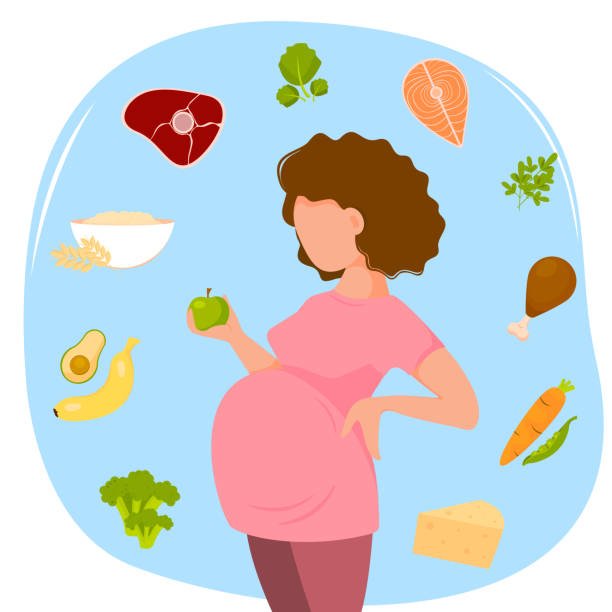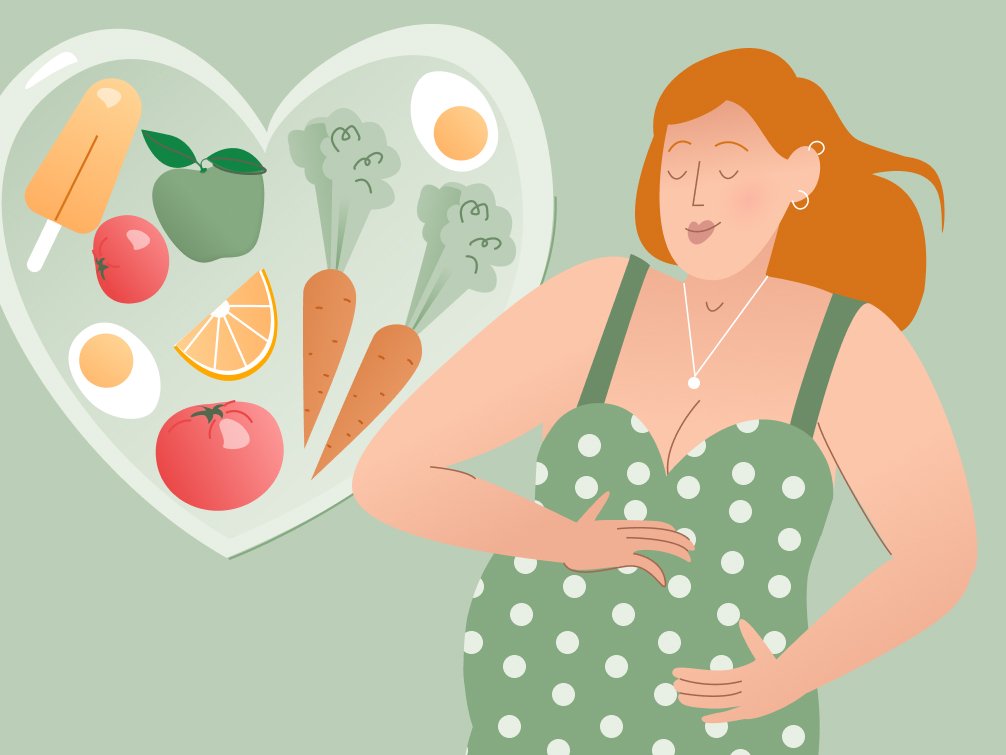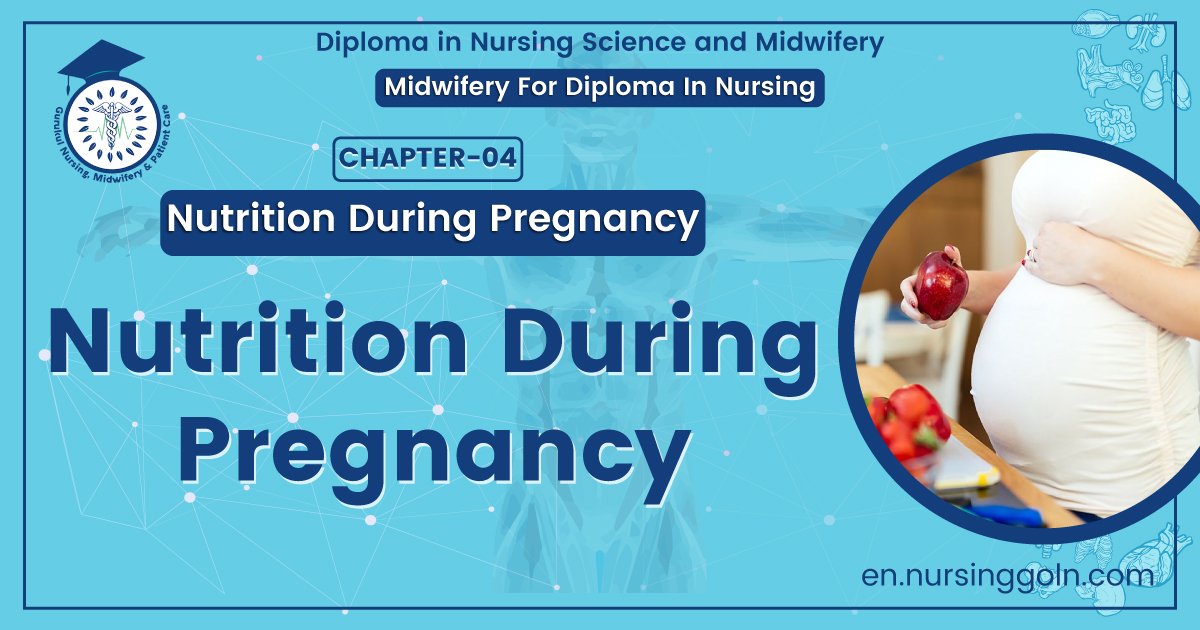Nutrition during pregnancy – This course is designed to understand the care of pregnant women and newborn: antenatal, intra-natal and postnatal; breast feeding, family planning, newborn care and ethical issues, The aim of the course is to acquire knowledge and develop competencies regarding midwifery, complicated labour and newborn care including family planning.
Nutrition during pregnancy
Nutrition:
The process of nourishing or being nourished, especially the process by which a living organism assimilates food and uses it for growth and for replacement of tissues.
Or
The science or study that deals with food and nourishment, especially in humans.

Importance of good nutrition:
Most people know good nutrition and physical activity can help maintain a healthy weight. But the benefits of good nutrition go beyond weight. Good nutrition can help:
1. Reduce the risk of some diseases, including heart disease, diabetes, stroke, some cancers, and osteoporosis
2. Reduce high blood pressure
3. Lower high cholesterol
4. Improve well-being
5. Improve ability to fight off illness
6. Improve ability to recover from illness or injury
7. Increase energy level.
Good nutrition:
Good nutrition means body gets all the nutrients, vitamins, and minerals it needs to work its best. Plan meals and snacks to include nutrient-dense foods that are also low in calories.
Balanced Diet:
A balanced diet is one that gives body the nutrients it needs to function correctly. In order to get the proper nutrition from diet, women should obtain the majority of daily calories from:
➤ fresh fruits
➤ fresh vegetables
➤ whole grains
➤ A legumes
➤ nuts
➤ lean proteins
Nutritional intake in different age group:
1. Children ages 2 to 8: 1,000 to 1,400 calories
2. Active women ages 14 to 30: 2,400 calories
3. Sedentary women ages 14 to 30: 1,800 to 2,000 calories
4. Active men ages 14 to 30: 2,800 to 3,000 calories
5. Sedentary men ages 14 to 30: 2,000 to 2,600 calories
6. Active men and women over 30: 2,200 to 3,000 calories
7. Sedentary men and women over 30: 1,800 to 2,200 calories

Normal weight gain during pregnancy:
a. Total normal weight gain during pregnancy is 11.5-16kg.
b. It should be 1.6 kg for the first trimester and 0.44 kg/week for the second and third trimester.
c. The amount of weight gained is important, however the nutrients that make up weight gain is more important.
d. Weight gain from a diet lacking is essential nutrients is not beneficial as weight gain from a balanced diet.
Nutritional requirements during pregnancy:
Antenatal education/Education plan for pregnant women on nutrition requirements:
Nutritional needs during pregnancy are:
1. Energy such as from carbohydrate and fat. Most of the pregnant women need about 300 extra calories a day during the last six months of their pregnancy.
Complex carbohydrates: Whenever possible, eat complex carbohydrates, such as:
➤ whole-grain breads and pastas
➤ vegetables
➤ beans
➤ legumes
➤ Stay away from their nutritionally deficient cousins, the simple carbohydrates:
➤ white bread
➤ cookies
➤ pretzels
➤ chips
➤ sugar
➤ sweeteners
2. Protein: Protein needs in the second half of pregnancy are 1 g/kg plus 20g/d (approximately 80 g/d for the average women).
Good sources of protein include:
➤ lean beef
➤ beans
➤ chicken
➤ salmon
➤ nuts
➤ peanut butter
➤ cottage cheese
3. Fiber: Try to eat 20 to 35 grams of fiber a day to help prevent constipation and hemorrhoids. Women can get these from whole grains, veggies, legumes and fruit. Products labeled refined or enriched aren’t as beneficial to women or their baby.
4. Vitamins and minerals: Vitamin and mineral preparations are commonly given but should not be substituted for adequate food intake.
5. Calcium: The daily requirement of calcium is around 1000 milligrams during pregnancy. Calcium helps build baby’s bones and regulates body’s use of fluids. Pregnant women need at least three servings of calcium per day. Good sources of calcium’ include:
➤ milk
➤ yogurt
➤ cheese
➤ cabbage
➤ tofu
➤ eggs
➤ pudding
6. Supplementation especially iron: To avid iron deficiency anemia the IOM recommends supplementing the diet of every pregnant women with 30 mg/d of elemental iron during the second and third trimester. If iron deficiency anemia is diagnosed, the therapeutic doses of elemental iron prescribed range between 60 and 120 mg/d.
Good sources of iron include:
➤ dark green, leafy vegetables
➤ citrus fruits
➤ enriched breads or cereals
➤ lean beef and poultry enriched breads or cereals
➤ eggs
➤ dried fruits
7. Folic acid: Folic acid has been shown to effectively reduce the risk of neural tube defects (NTDs). A daily 4 mg dose is recommended for patients who have had a previous pregnancy affected by NTDs. It should begin more than 1 month prior to pregnancy (Preferably 3 months) and continued through the first 6-12 weeks of pregnancy. Folate can get from these foods:
➤ liver
➤ nuts
➤ dried beans and lentils
➤ eggs
➤ dried beans and lentils
➤ nuts and peanut butter
➤ dark green leafy vegetables
- Diet alone does not reliably supply an adequate amount of folic acid.
- It can be prescribed over-the-counter (OTC) cheaply.
- Recommended amount is 5 mg/day for those who are at high risk or in disease condition like diabetes, anemia etc.
8. Salt restriction: Moderate amounts of food containing sodium are not harmful during normal pregnancy. In fact, sodium restriction may be potentially dangerous. There is no evidence that rapid weight rapid weight gain in preeclampsia can be controlled with sodium restriction.
9. Iodine: Iodine is critical for the development and functioning of the thyroid gland and regulation of metabolism. The recommended dietary allowance (RDA) for pregnant women is 200 micrograms per day. Women can get iodine from:
➤ fluoridated drinking water
➤ iodized (table) salt
➤ eggs
➤ milk
10. Riboflavin (B2)
This vitamin is important for fetal development and growth. The RDA for pregnant women is 1.6 milligrams and 1.8 milligrams for nursing women. A prenatal vitamin may be best consistent source, but B2 can be found in liver, with smaller amounts present in soybeans, yogurt, and mushrooms.
11. Thiamine (B1)
Thiamine is important for metabolism and development of the brain, nervous system, and heart. When women are pregnant, they need increased amounts of many vitamins, including B1. The RDA for pregnant women is about 1.3 milligrams.
12. Vitamin A
Vitamin A is critical for proper cell growth and the development of the eyes, skin, blood, and immunity and resistance to infection.
13. Vitamin B-12
Vitamin B-12 is found mainly in meats and dairy products. So it can be a problem for vegans or strict vegetarians. If anyone have dietary restrictions, make sure that vitamin supplement has adequate B-12. Nutritional yeast, fortified with B-12, is a great staple for vegetarians. It has a salty and savory flavor and tastes similar to Parmesan cheese.
14. Vitamin C (ascorbic acid)
The body does not stockpile Vitamin C, so you need regular sources to fulfill your daily requirement. The RDA for pregnant women is 80 milligrams per day. You can reach your goal through daily intake of citrus fruits, adding fresh lemon or lime juice to your water, and consuming fresh fruits and vegetables like berries, bell peppers, and broccoli.
15. Vitamin D:
- Adequate vitamin D is important for the health of both mother and baby.
- All women may choose to take vitamin D supplements (10 micrograms/day), but this is
particularly important in the following groups: ✓ Housebound women or those who have limited exposure to sunlight, such as women who usually remain covered when outdoors.
✓ Those with a diet particularly low in vitamin D. Good sources of vitamin D are oily fish, eggs, meat, vitamin D-fortified margarine or breakfast cereal.
✓ Women with a pre-pregnancy BMI >30 kg/m
16. Water-sufficient amount of water intake is very important for pregnant women. The energy requirement of each food component should be focused, such as protein should be increased for nearly 2 times of nonpregnant women.

[Ref-Nutrition and Dietetics/H.Al Hasib]
Important tips regarding nutrition for pregnant and lactating mother:
➤ Eat more food during pregnancy.
➤ Eat more whole grains, sprouted grams and fermented foods.
➤ Take milk/meat/eggs in adequate amounts.
➤ Eat plenty of vegetables and fruits.
➤ Avoid superstitions and food taboos.
➤ Do not use alcohol and tobacco. Take medicines only when prescribed.
➤ Take iron, folate and calcium supplements regularly, after 14-16 weeks of pregnancy and continue the same during lactation.
[Ref-Nutrition and Dietetics/H.Al Hasib]

Ways to meet nutritional requirement during pregnancy and lactation:
1. The pregnant/lactating woman should eat a wide variety of foods to make sure that her own nutritional needs as well as those of her growing foetus are met.
2. There is no particular need to modify the usual dietary pattern. However, the quantity and frequency of usage of the different foods should be increased.
3. She can derive maximum amount of energy (about 60%) from rice, wheat and millets. Cooking oil is a concentrated source of both energy and polyunsaturated fatty acids.
4. Good quality protein is derived from milk, fish, meat, poultry and eggs. However, a proper combination of cereals, pulses and nuts also provides adequate proteins.
5. Mineral and vitamin requirements are met by consuming a variety of seasonal vegetables particularly green leafy vegetables, milk and fresh fruits.
6. Bioavailability of iron can be improved by using fermented and sprouted grams and foods rich in vitamin C such as citrus fruits.
7. Milk is the best source of biologically available calcium.
8. Though it is possible to meet the requirements for most of the nutrients through a balanced diet, pregnant/lactating women are advised to take daily supplements of iron, folic acid, vitamin B and calcium.
Nutrition for lactation mother:
➤ Energy need more than during pregnancy
➤ Protein
➤ Vitamins and minerals.
➤ Specific concern
Factors that influence nutritional intakes during pregnancy:
a. Culture
b. Age
c. And nutritional knowledge
d. Stress,
e. anxiety,
f. fatigue and other psychosocial characteristics may influence the food choices women make during pregnancy,
Medication during pregnancy:
- Advise to use as few medicines as possible during pregnancy & only when benefit outweighs risk.
- This includes OTC medication and complementary therapies.
- Nausea and vomiting of pregnancy generally resolve by 16-20 weeks of gestation; ginger may be beneficial. Antihistamines have also been used.
- Heartburn may be alleviated by taking small meals and raising the head of the bed.
Exercise during pregnancy:
✓ Exercise during pregnancy is very important.
✓ Explain benefits of exercise to pregnant mother.
✓ Demonstrate how to exercise being a pregnant, regularly and systematically.
✓ Discuss about following issues:
- When to start?
- How to start?
- What (type of exercise) to start?
- How to continue?
- When to terminate?
Benefits of Exercising During Pregnancy
✓ Feel better.
✓ Develops fetal brain better.
✓ Relieve backaches and improve posture by strengthening and toning muscles in back, butt, & thighs
✓ Reduce constipation by accelerating movement in intestines
✓ Prevent wear and tear on your joints by activating the lubricating fluid in your joints
✓ Helps sleep better by relieving the stress and anxiety
✓ Look better. Exercise increases the blood flow to your skin, gives a healthy glow.
✓ Eases the process of labor and delivery.
✓ Helps regain pre-pregnancy body more quicklyatob .
✓ elps to carry the weight gain in pregnancy
✓ repares for the physical challenge of labor and birth
✓ mproves mood & gives energy
✓ elps mother to sleep better.
✓ elps getting back into normal after baby is born
Safe exercises during pregnancy
✓ Swimming
✓ Brisk walking or walking
✓ Indoor stationary cycling
✓ Step or elliptical machines
✓ Dancing
✓ Swimming
✓ Water aerobics
✓ Yoga
✓ Pilates
✓ Moderate body movements.
